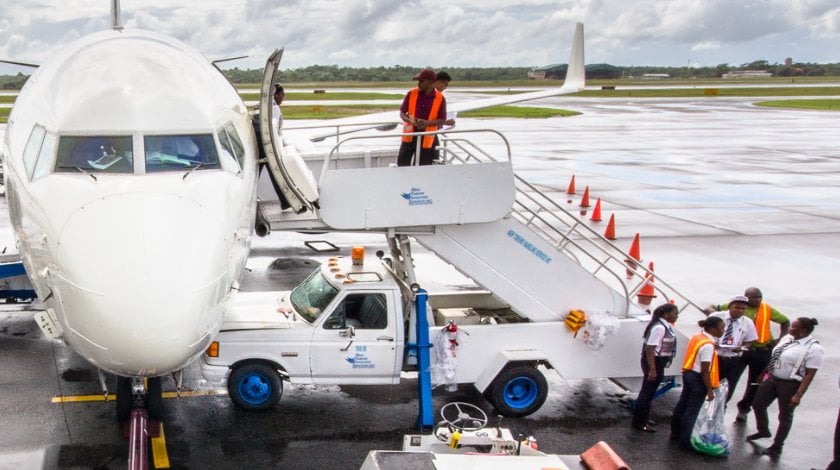Photo: timehrihandling.com
Reading Time: 3 minutesThe romance of flying is such that it is very easy to miss those on the ground — and often in the background — who make travelling a pleasure.
How does an aircraft get ready for take off? Who placed the in-flight magazines where they are easily accessible? Who packs the meals and how come the toilets are so clean?
The answer to these questions will point you to one of the most important, but overlooked, functions in the airline industry — ground handling.
It’s real important
Ground handling makes it possible for flights to land and take off on time, ensures that all boarding cards are issued correctly and that your bags are security checked and then loaded on to the right aircraft.
A team also makes sure that the aircraft is cleaned properly, has enough aviation turbine fuel and is pushed back for a flight. The International Civil Aviation Organisation (ICAO) defines ground handling as a service necessary for an aircraft’s arrival and departure. What it means is that ground handling involves a lot of manpower to keep all the processes ticking.
Manpower, or a trained manpower, forms a very important aspect of ground handling. For example, at the moment, the sector employs around 45,000 people in various airports in India.
While the sector offers jobs to matriculates, the qualifications vary according to the job. So someone involved in passenger facing activities will need to be a BA (many come through aviation schools) while those applying for managerial positions are post graduates, MBAs and chartered accountants.
However, each person is thoroughly trained for a specific job. “Ground handling personnel go through training apart from classroom studies before they get graded and rated as ready,” says Murali Ramachandran, CEO-India, Celebi Aviation.
Turkey-based Celebi, which has operations in Frankfurt and Budapest, does ground handling at the Delhi and Mumbai airports.
The training sessions are long as the individual needs to understand all issues connected with air travel — such as being trained in the various types of check-in systems of different airlines or for handling dangerous goods.
It also takes time and skills to be able to operate a tug truck for pulling an aircraft or for operating equipment which a main and lower deck loader uses on a widebody aircraft. And loaders have to be trained on exactly on how to load an aircraft. “You cannot load bags as you feel like. The loading is already pre-decided by a load master and he decides how much baggage can be loaded into section A, B, C and the loaders need to be trained to follow those instructions,” says Ramachandran.
Challenging jobs
The jobs are challenging and the scope they provide for growth is immense. Ground handlers have to meet deadlines like turning around an international jet in 35 minutes after cleaning the cabin and the toilets and filling water even as passengers on the other side of the terminal are being checked in.
According to Prem Bajaj, Chairman of Bhadra, which employs over 3,000 members and has a presence in seven airports (Chennai, Kolkata, Thiruvananthapuram, Kozhikode, Mangaluru, Trichy and Coimbatore), ground handling is very process driven. He points out that the number of ground handling people required varies from aircraft to aircraft. “Normally 11 people are required to clean a narrow body cabin within 13 minutes. This goes up to 27 people when it comes to larger aircraft,” he says.
But for those keen to make a life-long career in ground handling the sky is the limit. Take the case of Celebi India where the ground handling Chief Executive Officer started as a ramp coordinator, a job that supervises loading and oversees aircraft turn around.
Not just manpower
However, Arvind Kumar, Secretary General, Ground Handlers Association of India, is quick to dispel any notion that ground handling is only limited to manpower supply.
“That is what it has unfortunately got reduced to at Indian airports. But ground handling is a specialised security sensitive, capital-intensive business. It uses highly specialised equipment and highly trained human resources. It is not an airline business; it is distinct from an airline business,” he says.
The newly set up Association has eight ground handling agencies as its members who manage ground handling activities in metros that account for almost 80 per cent of the traffic.
Adds Ramachandran: “We invest in high quality equipment which is specialised. Our equipment is environment friendly with the latest environment norms. For example, we use specialised tugs to take baggage. They may be 8 to 9 times more expensive. But that is what the business demands.”
Though the activities of the ground handling sector in India constitute only about 1 per cent of the total cost of air travel compared with about 5 per cent in the European Union, it is clearly significant and has a lot of potential. That is why it has the presence of international players like Globe Ground and Menzies.
However, Kumar probably sums up the significance of the sector best when he says, “A misplaced baggage is as traumatic as airfares. All these 45,000 people are actually servicing bad toilets, misplaced bags. Ground handlers are the wheels that run the airline industry.”

